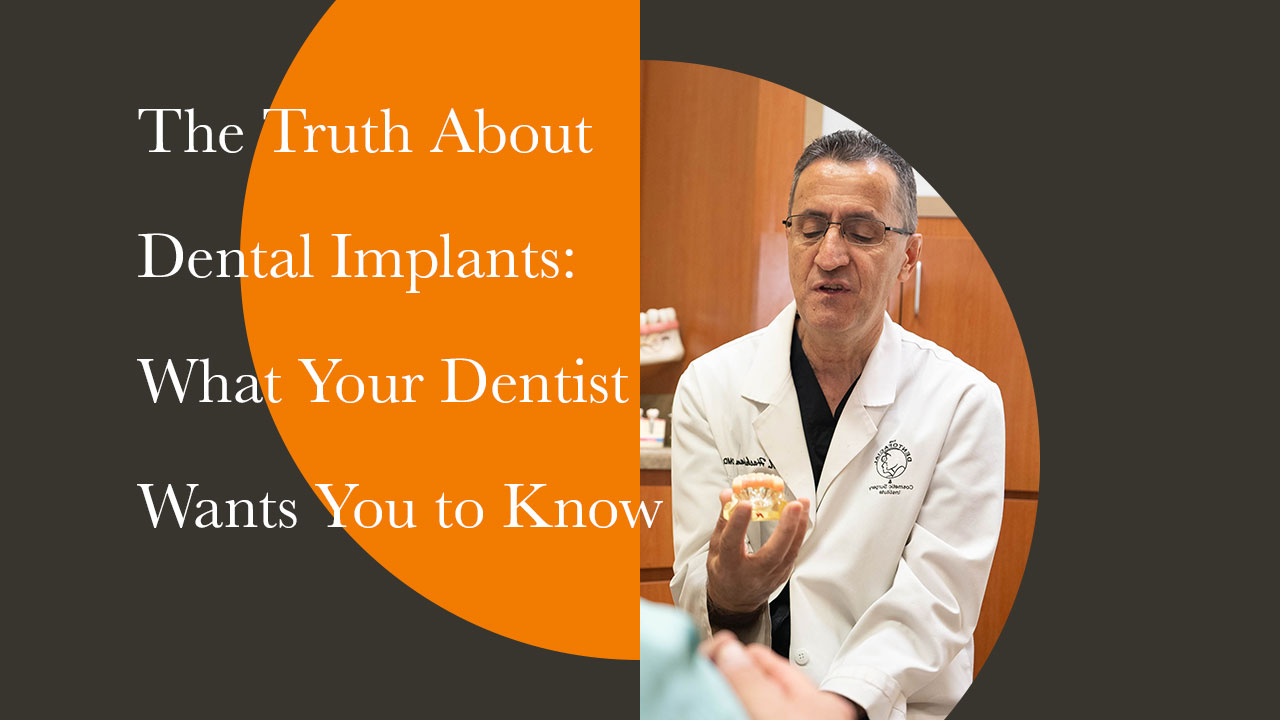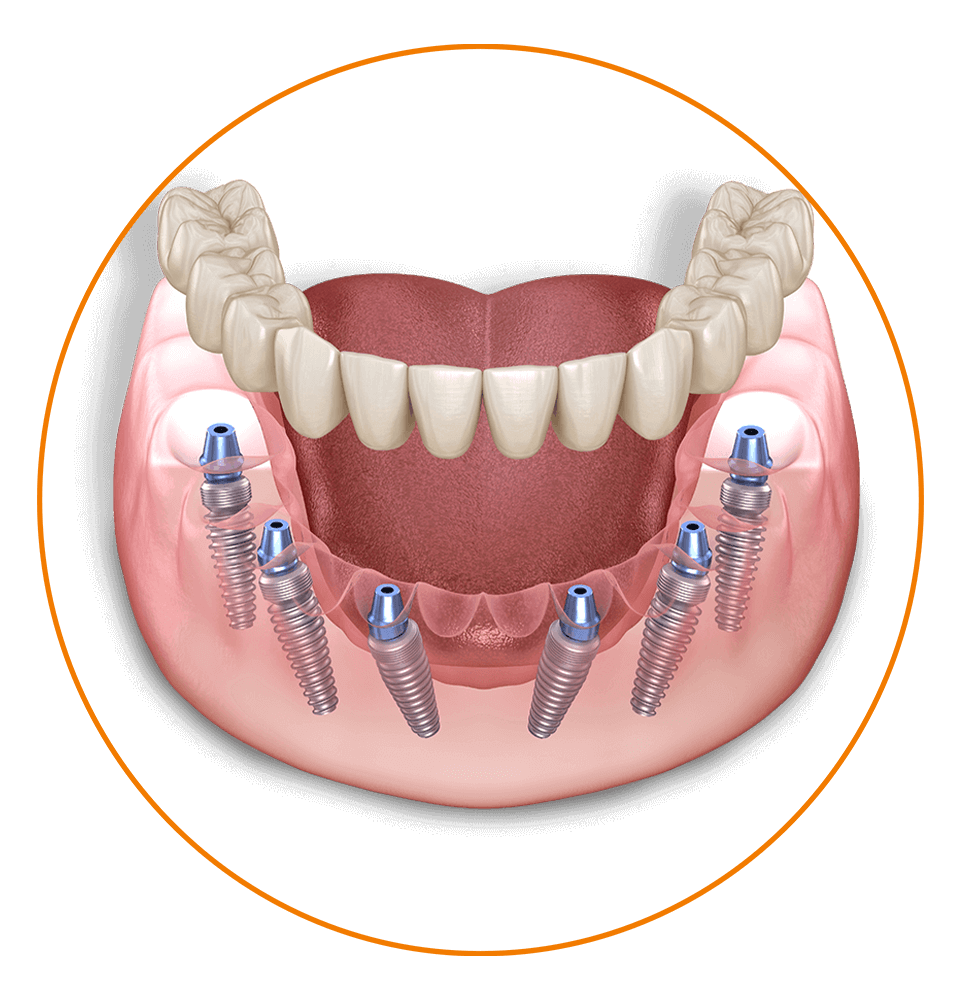Dental Implants - West Central Florida
Rediscover a Complete and Confident New Smile

"Painless Extractions: Dr. Michael Hashemian"
Enjoy a Long-Term Smile Transformation with Dental Implants
Whether you lost a tooth to injury, severe decay, or advanced gum disease, you may be experiencing complications such as speech issues, problems eating, progressive bone loss, and undesirable facial changes. Tooth loss can also lead to drifting of adjacent teeth, bite misalignment, gum disease, and loss of other teeth. The three-part dental implant consists of a dental implant post, abutment, and restoration. The titanium implant post is surgically placed in your jawbone to support a crown, bridge, or full mouth prosthesis.
The dental implant abutment is attached to the implant post with an abutment fixation screw that is separate or built into the post. The three components work together to optimally restore oral function and smile aesthetics for decades or even a lifetime. Dental implants at Dentofacial & Cosmetic Surgery Institute are the next best thing to your natural teeth, partly because they’re the only replacement for missing tooth roots. Dental implants offer outstanding natural function and beauty, durability, longevity, and versatility that other tooth replacement options can’t come close to matching!

The Long-Lasting Benefits of Dental Implants
- Restores ability to chew and eat
- Elevates cosmetic appearance
- Preserves the health of surrounding bone and gums
- Prevents bone loss-related facial collapse
- Helps keep adjacent teeth stable
- Improves oral health and quality of life
Our Versatile Dental Implant Options
Dental implants are the only permanent replacement for an extracted or missing tooth. The post is made of titanium, which offers a high strength-to-weight ratio, corrosion resistance, durability, and superb biocompatibility.
Once the dental implant fuses with your underlying bone over a few months, it assumes the role of your missing tooth root and can be fitted with a zirconia dental crown.
A partial prosthesis (fixed bridge) can replace two or more missing teeth in a row with only two or three dental implants. Implant-supported bridges are more stable and secure than traditional bridges and don’t compromise adjacent teeth’ structural integrity. They also stimulate the underlying bone to keep it healthier, while tooth loss continues with a conventional bridge because the missing tooth root isn’t replaced.
A complete dental prosthesis (fixed bridge) replaces all your upper or lower jaw teeth. The number of implants varies depending on whether you choose a removable or fixed implant-supported denture. A removable prosthesis (overdenture) attaches to a bar or ball in socket attachments, whereas a fixed prosthesis is permanent and removable only by a dentist or oral surgeon.
A fixed denture eliminates issues associated with traditional dentures, including gum irritation, slippage, garbled or slurred speech, messy adhesives, nightly cleaning, and food limitations while stimulating your underlying bone to keep it healthy.
All-on-X full mouth dental implants provide a permanent solution for all your missing teeth and additional stability. Dr. Hashemian also offers Hybridge® and Teeth Tomorrow® full mouth dental implants in Spring Hill, Lecanto, Land O’ Lakes, and Clearwater, FL, and will help you choose the best protocol to address your needs.
These are viable solutions if you have multiple missing teeth, unrestorable failing teeth, or ill-fitting traditional dentures. In many cases, these streamlined protocols allow remaining teeth to be extracted and temporary teeth to be placed on the same day as dental implant surgery.
if you’ve been told you’re not a candidate for conventional dental implants due to moderate, advanced, or extreme bone resorption in your maxillary (upper) jaw, zygomatic implants can provide a life-changing solution. Instead of being placed in your jawbone, zygomatic implants are surgically inserted in the strong and dense zygoma bone, more commonly known as the cheekbone.
Zygoma implants are three to five times longer than conventional implant posts because the zygoma bones are located further from your gum line. The procedure doesn’t require bone grafting or a lengthy healing period, so implants can be placed immediately, and you may qualify for same-day temporary teeth.
Implant placement in the edentulous (toothless) upper jaw can be challenging due to limited bone quantity and the presence of the maxillary sinuses. Pterygoid implants are an alternative option that bypasses the need for augmentation procedures such as sinus lifts.
Anatomically, pterygoid implants are placed at the junction of your upper jawbone and the pterygoid process of the sphenoid bone. Pterygoid dental implants are typically 15–22mm long, with 18mm being the most used length. Pterygoid implants enable transitioning from no teeth or a removable, ill-fitting denture to a fixed temporary full mouth prosthesis in as little as one day!
Our Personalized Dental Implant Process
Consult & Planning
Your journey to a restored smile starts with an implant consultation at the Dentofacial & Cosmetic Surgery Institute. During your initial visit, Dr. Hashemian performs an oral exam, discusses your concerns, and answers all your questions.
In addition to digital X-rays, a cone-beam computed tomography scan is done to analyze your bone structure, nerve tissue, and sinus cavities and plan precision dental implant surgery. At this visit, our team will discuss costs and financing options and tell you everything you need to know about the process.
Procedure & Same-Day Teeth
During dental implant surgery, Dr. Hashemian uses highly sophisticated dental instruments to make tiny holes in predetermined sites in your jawbone with the strongest bone density. During and after dental implant surgery with general anesthesia or IV sedation, your vitals are continuously monitored to ensure your safety and comfort.
With full mouth dental implants, temporary teeth can typically be placed the same day as surgery, while with the Teeth Tomorrow® protocol, you’ll be fitted with a temporary prosthesis the following day.
Follow-up Appointments
Even though great care is taken to place implants precisely, adjacent teeth can be injured, or the nerve in the lower jaw may occasionally be affected. Usually, altered sensations resolve within time, but they can be permanent and uncomfortable. The number of follow-up visits is based on the type and number of dental implants you receive.
But in all cases, these follow-up visits are essential to assess your gums, implants, and surrounding teeth to determine if healing is progressing as it should and to look for any signs of complications.
Healing & Final Restorations
Sometimes, we use platelet-rich fibrin derived from patients’ blood because it enhances the natural healing process. Although most patients don’t experience significant postoperative pain, we prescribe pain medication and antibiotics to make your recovery as easy as possible. Dental implants take three to six months to integrate with your underlying bone in osseointegration.
While single-stage implants don’t require a second procedure to uncover them, a minimum of six weeks of healing time is required. The final crown, bridge, or full mouth prosthesis is carefully customized and fabricated to ensure long-lasting function and natural-looking aesthetics.

Schedule An Appointment
I understand the information disclosed in this form may be subject to re-disclosure and may no longer be protected by HIPAA privacy regulations and the HITECH Act.

Find out if you're a
candidate for dental implants

Answer the Following Questions To Learn more about our pricing and financing options.


